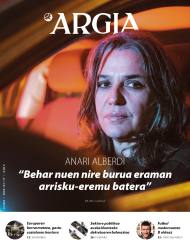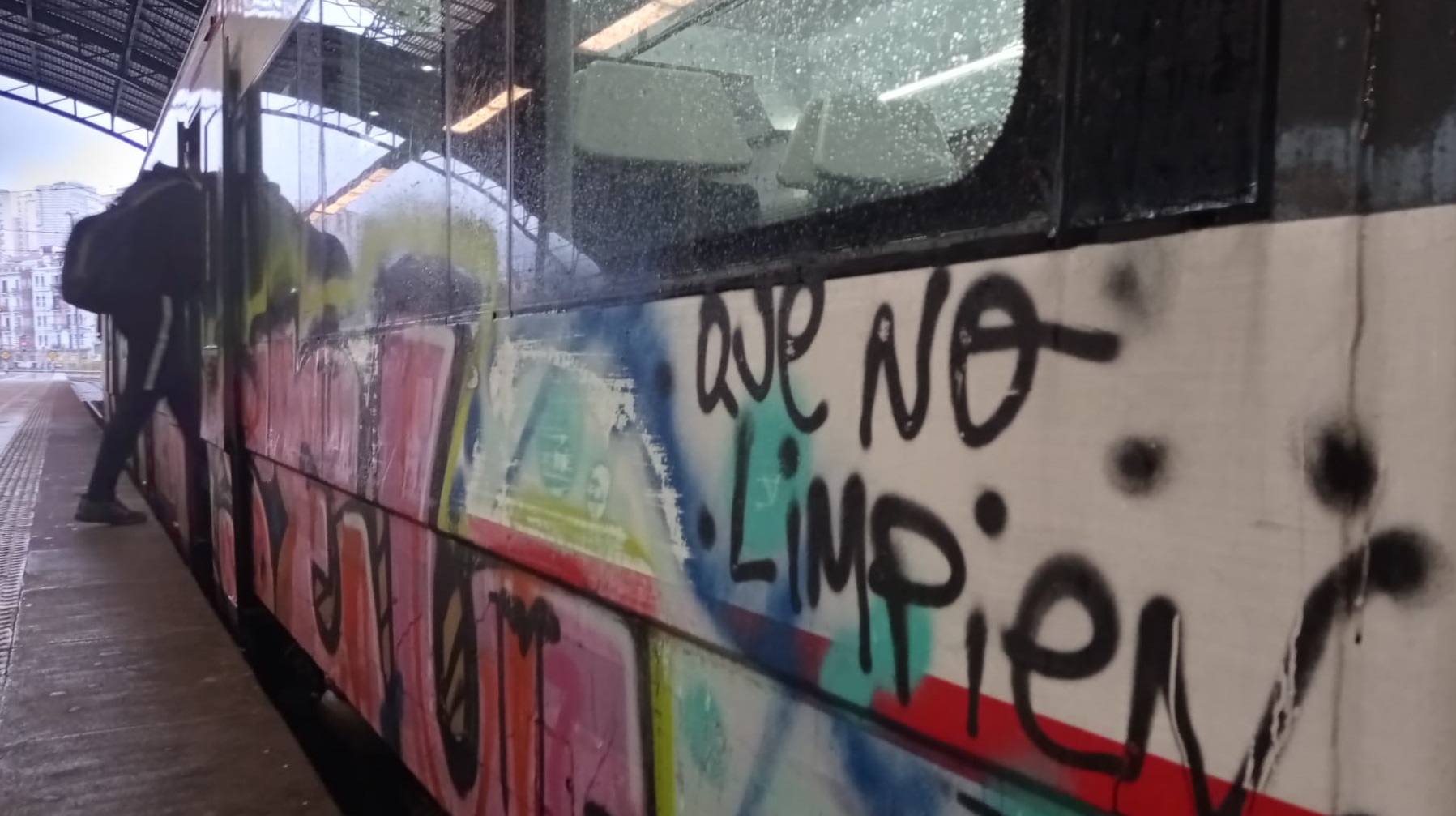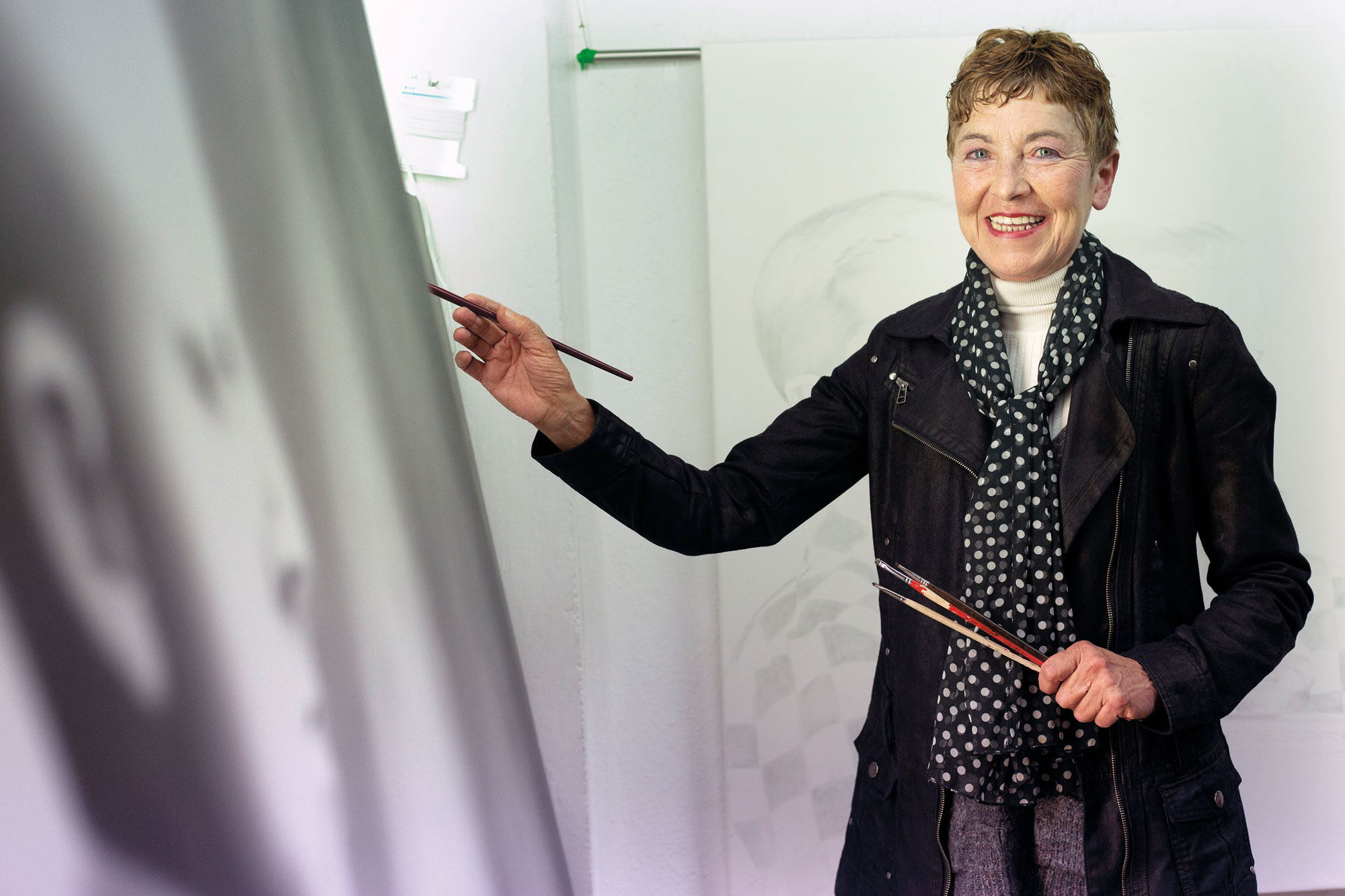"We all have aesthetic experiences, but it's very difficult for that to happen in a museum."
- He has been looking and trying to work with “those who are able to intensify the environment”, paying attention to those who are willing to do so. It works mainly from images, words, light and its forms and ways of appearing in space. He is now working on the excuse for an exhibition to be opened in Barcelona in May.
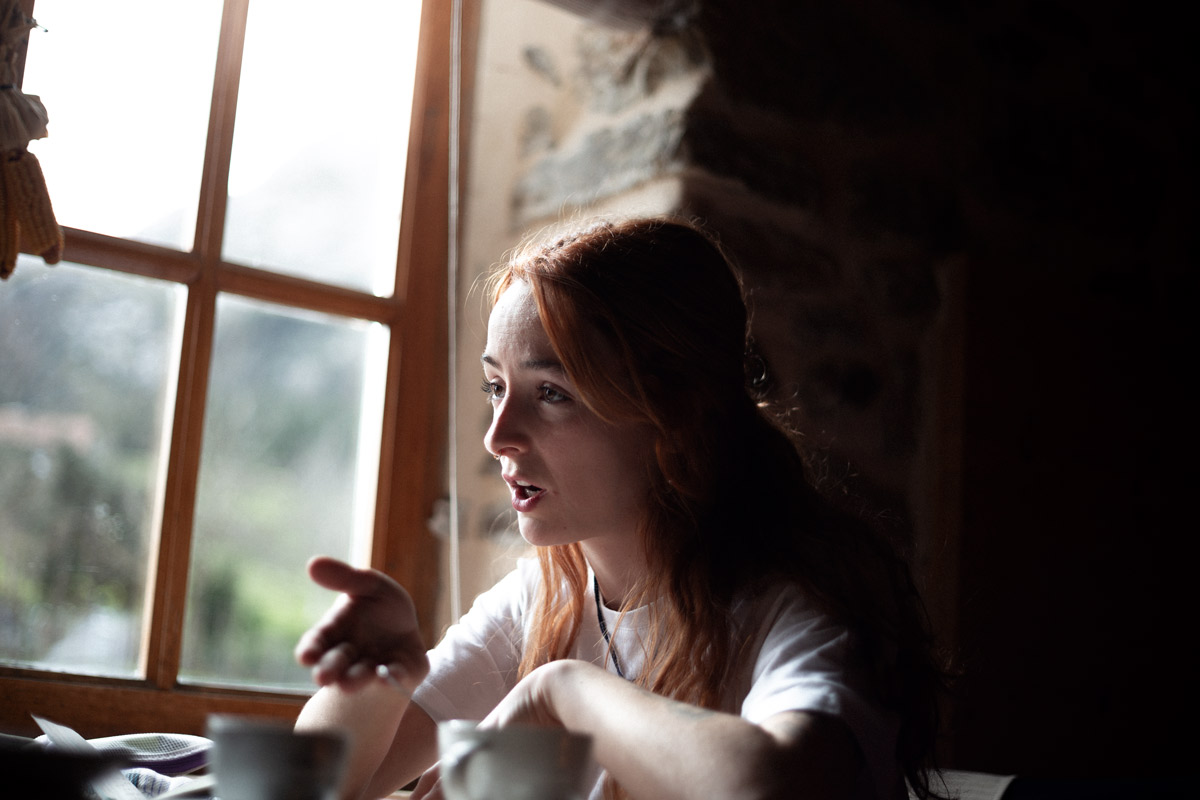
Jone Erzilla. Durango, 1999
After graduating from Fine Arts at the UPV, he completed the Master in Research and Creativity in Art. After completing her studies she conducted internships at the Air Gallery, where she has worked for two years. He has had several exhibitions, including Ex3, his first solo exhibition at the Museum of Art and History of Durango, and Two thousand collective buttons at the Air Gallery.
Who is Jone Erzilla? I still don't feel legitimacy to say I'm
an artist. And also I don't mean I'm like that, because I don't really understand it, as I don't understand the word art. I know who artists are for me, I know how to identify that, but I don't want to tell myself that at the moment. I don't know if it's not to put pressure.
Within the word artist, I think there are definitions that are not the same in the word musician, because by saying artist, greatness or ego would be included. I don't know, it's because I see musicians from farther away.
Can he be the artist because he is a more “solitary” work? In general, bertsolaris usually have no problem saying they are bertsolaris. I do not think I agree with the way in which the word artist is understood in our society. And since I do not agree, I do not want to use it. I don't know when and who decides what art is. Now that I have been given an expo, I think that art is supposed to be in that exhibition, but little more. I think I can decide that
something is art when that work is able to take on the sensitivity of many people from different places.
Speaking of understanding, what place does art comprehension have for you? When I have
more fun with things, or they approach me and let me be, there is always a misunderstanding. It's not that I don't understand so much, but I don't need to make a reading in my mind about it. Sometimes I do reading unintentionally, but when I don't, because I'm only in that, I'm in that. And I feel silent. I'm in a search, but not for words.
Lorea Alfaro and Jon Otamendi are important references to me. At an exhibition in Barcelona, Lorea said that there was nothing to understand in the exhibition, that he had to be alone. I think that's literally the case. The aesthetic experience is universal, but it's very difficult for that to happen inside a museum. It's much easier to happen here, looking at Anboto [points out of the window]. If the sun's rays
are reflected out there, I can be flirting and my mother too. But you don't have to understand anything.
Then people can't be told, "You don't understand," because that also frustrates you. I think you have a lot to do with that, as a person, or how your body accesses those places.
It is always received and delivered differently depending on where and how it is found. College time is a
year of bubbling feeling, because we live partly surrounded by people who are in their own field. Leaving this age behind, do you see yourself now very out of the bubble? I'm still part of a bubble, but not so much. College time is thinking about that 24/7 and talking about everything that has to do with it. You can keep going outside of it, but it's harder, because we all fall into words and we don't just work with words.
When you leave Fine Arts, you don't know where the land is, or where to step. In that bubble, it gives importance to a corner, for example, and everyone in your environment is also giving equal importance. Then you get out of there and you wonder what that meant.
I think it's very difficult that what you do and your place in the world makes sense on the same level.
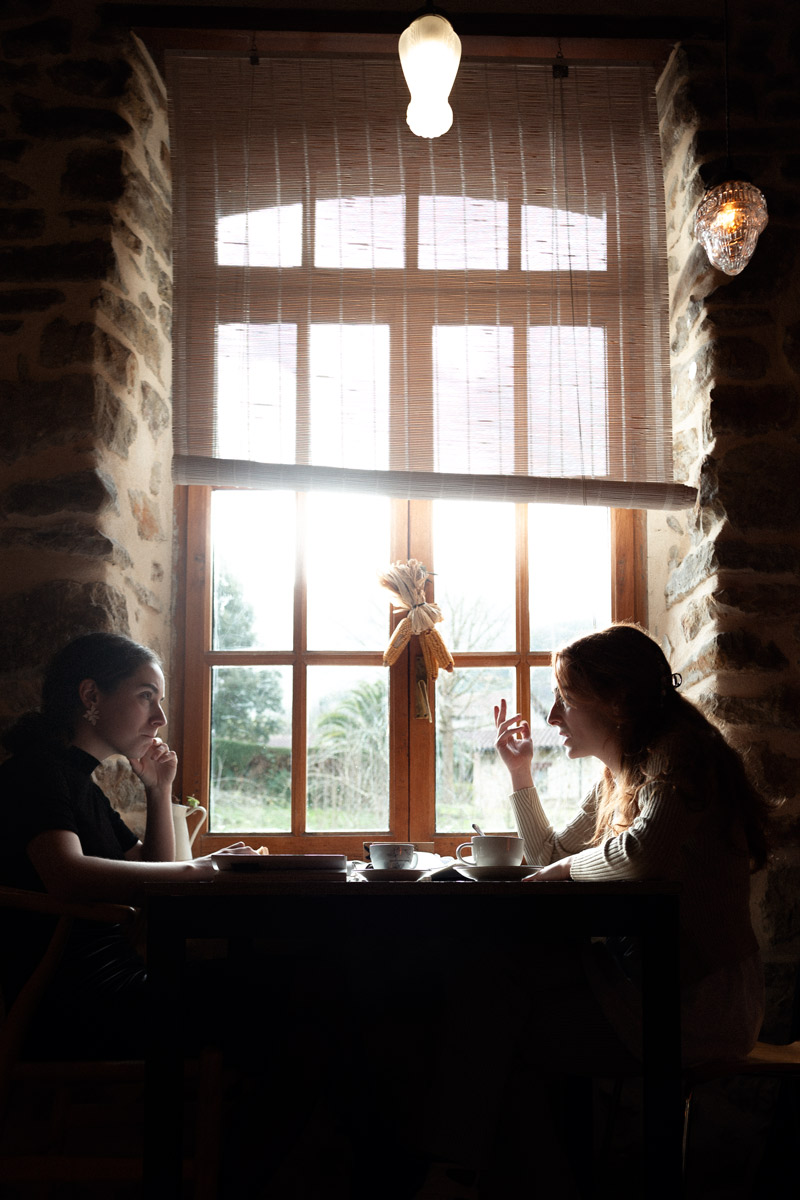
This year he presents the exhibition in Barcelona. He was awarded a scholarship last year. Why you? It made
me so excited. It was a great economic aid and that doesn't happen many times. “You’ve won,” they told me. “Win.” And it made me graceful. Instead of saying “you’ve been elected,” right?
I was told that they liked it most, where I was saying and writing the approach. I had to present the proposal for an exhibition. I presented the material I was working with at the time and what I would do, but I knew I wouldn't because after a year it couldn't be the same. And so I made that clear.
I work a lot with the space I'm in. What interests me in this case is the exhibition hall, the same room. And that's where I wanted to leave the work so that space makes sense there, totally conditioned.
You come from a family of musicians and you are also a musician. Do you think that knowing within another artistic discipline has some reflection in your work? If you develop anything from a
young child, or you have someone around you who is sensitive to something, it's normal for you to be important too. In my case it's because my father is a musician.
Anyway, my grandmother has caused me the same. Then I realized, but my mother has always had many things at home, things that didn't make sense to anyone, nothing functional, little things that have been kept away, little decorations… It's something that anybody has or doesn't. And it's no bad thing that we're not all crazy about that kind of stupid stuff, because if you don't hold anything.
In the Final Master's Work [MAL] you say everything is said, but it seems pertinent and important to repeat some things. What do you think about plagiarism? There are many people who are
looking to do “something original” and the truth is… I wouldn’t want to be thinking about that. Because you're not going to do something original. Or yes, but that's why it's not worth more. If something is happening here and now, it's not a copy that I do that, because I do it here and now.
It usually happens to me that a person is reading and sticking their writing for a while. I find it very nice to be able to stay in me the way someone writes, and I think: “Ze maja, he has given me his way of writing.” So the important thing is to be aware of who these people are and if you artstically add up to what they do. My referents are all those who are here [notes MAL]. And I and my work seem a little bit like us, so thank you.
Etymologically, the reference term means “what brings back”. When I heard it, I found it very nice and I think it helps to deter the word itself. Sometimes, after doing something, we look at the people who have done these things before, and we put them as a benchmark when they haven't. And I think the referent doesn't have to share the channel with you. For example, my referents include more writers than plastic artists. Or it might be Bad Gyal or Gossip Girl, there's something that interests me, even if we don't know what.
"If here and now something is happening, it's not a copy that I do that, because I am here too and now I am."
I like things, I'm fascinated by a few, and I really like a chapter of your MAC. I like a lot of things, I can be flirting with a lot
of nonsense, and less badly, because I live like that. But I don't often get that point of admiration. I want more than to seduce.
Often, moreover, I cannot distinguish the need for something that has fascinated me or fascinated me with what I am doing. I find it dangerous and I am afraid to keep it. I have doubts, if I do not want things stronger than what I can allow ...
However, if someone is working something from a place that is yours, for me that is art.
It brings to my head the album by Lurpekariak Itsasorik Iturrira. The other day I told Jon Otamendi: I feel selfish about the things that are happening in the world, being in my house, doing nonsense and flirting with them. Devoting time to that which does not help anyone. But, well, these
are thoughts of those of us who have learned absurd careers; every day we think about what we're doing with life. Otamendi told me that he was happy to hear it, and that to work something so yours you have to do a selfish exercise, then, by eliminating it, to be able to bring something to others.
Sometimes you and your people
are the content of your work. What place do these bodies occupy in your work? I've used my body many times, but not because I'm the closest. Well, more than my body, I've used the image of my body, it's very different. I'm not a dancer. I've used my body because I have a certain intuition, because I know how I want to appear in front of the camera, because I have worked.
What is the place of social media right now? I am a 24-year-old girl who uses them from where most use them to “show me.” Anyway, I use them a lot as a tool. They allow me to play this specialization, adapting to specific formats: each publication can have a maximum of ten photographs, the format must be the same in all, with or without text... You can not notice, but I know that there
are people who play Instagrama and that allows to surprise with the works of others. That seems to me a passing. There are people who force me to stop and look at their profile, and I find it very difficult to offer that space at the same time on a platform that doesn't make sense of time.
I also spend a lot of time watching my profile. I like to see some decisions repeated, for example, becoming aware that the way I took two years ago to double a role is the same as for today, without being intentionally made.
Apart from that, Instagrama seems to me to be very dangerous. You must be aware at all times that you are playing in a format. If I have a bad day I can be seeing things for a long time and it can hurt me, because comparisons can be super soft and can distort many things. You have to keep in mind that you are seeing the images of some things and that they are nothing.
"I feel selfish about the things that are happening in the world, doing and flipping stupid things in my house."
You cannot interview an artist without mentioning the word precariousness. Yes… Always. In relation to this, for example, I work with what I have around me, with the materials I can use. It doesn't hurt me, for example, to do anything in metal, because I haven't had a chance to do it. I've never had money to do it. And now what happens to me
is that I don't know how to get away from the fangs, but I think it's very important not to fall into that. I don’t find sense in thinking “because now I have money and I don’t know what”, or at least when it’s in pride.
He once told me that he had connected a
lot with an explanation from Ursula K. Le Guin: Clay vs Granite. I believe that artistic processes have other rhythms and modes in time. When you're immersed in an art process, you're all the time, even if it's often passive. You're all the time drawing attention to some things.
I tried a lot to put words to that way of doing or thinking about art, and at that point I read the chapter Being taken by granite (perceived as granite) of the book Ursula K. Le Guinen Telling is listening (Counting is listening). Many of the things he said reminded me of some ways of working. It tells how clay is what a material is allowed to tread, what remains and leaves marks, what receives the weight of others and what is constantly transforming, while transforming the environment. Granite, on the other hand, is almost unchangeable, except with explosives. If you stop leaving marks and you have to do it with very suitable shoes…
But mud needs a defining point, a granite point. What happens is that we sometimes try to reinforce this point of definition and that some things become granites without passing mud.
Behin batean, gazterik, gidoi nagusia betetzea egokitu zitzaion. Elbira Zipitriaren ikasle izanak, ikastolen mugimendu berriarekin bat egin zuen. Irakasle izan zen artisau baino lehen. Gero, eskulturgile. Egun, musika jotzen du, bere gogoz eta bere buruarentzat. Eta beti, eta 35... [+]
This text comes two years later, but the calamities of drunks are like this. A surprising surprise happened in San Fermín Txikito: I met Maite Ciganda Azcarate, an art restorer and friend of a friend. That night he told me that he had been arranging two figures that could be... [+]
On Monday afternoon, I had already planned two documentaries carried out in the Basque Country. I am not particularly fond of documentaries, but Zinemaldia is often a good opportunity to set aside habits and traditions. I decided on the Pello Gutierrez Peñalba Replica a week... [+]









